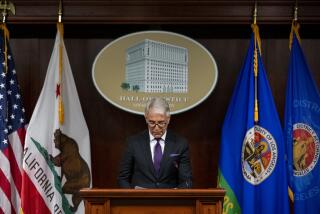Aide Testifies Duncan Did Not Have Ill Intent
- Share via
HOUSTON — David B. Duncan’s former assistant broke down in tears on the witness stand Thursday as she explained that her boss at accounting firm Arthur Andersen didn’t believe he had done anything wrong when he directed the shredding of Enron Corp. audit material last fall.
The emotional statements from Shannon Adlong, along with other testimony Friday, appeared to bolster the defense’s contention that fired Andersen partner Duncan and Andersen in-house attorney Nancy Temple lacked criminal intent at the start of Enron’s meltdown in October.
Their state of mind is crucial because the obstruction law says a defendant must act “corruptly” to be convicted.
Duncan led Andersen’s team of Enron auditors in Houston. Adlong testified that on the day Duncan learned he had been fired from the 89-year-old accounting firm in January, he told her that “no one on the engagement team did anything wrong” and that he “just thought [he] was following orders.”
Duncan testified that part of what prompted him to order the destruction was an e-mail sent by Temple and forwarded to him citing Andersen’s document-retention policy.
Andersen has suggested that Duncan pleaded guilty to obstruction of justice and cooperated with investigators in hopes of avoiding a lengthy jail sentence.
Duncan, the government’s key witness in its obstruction-of-justice case against Andersen, has denied that motivation.
In Friday’s testimony, Adlong described Duncan as reluctant to start the process of picking through his files to determine which records to toss out.
About half of the documents he identified to toss out, she testified, had nothing to do with Enron. The Enron-related material, she said, appeared to be drafts of Enron transaction documents that dated as far back as 1996.
In another development Friday, U.S. District Judge Melinda Harmon told the lawyers that a juror had sent her a note fearing that another juror might intentionally slow deliberations to retaliate for a third juror’s consistent tardiness. Harmon said she had not decided how to respond.
Earlier Friday, a senior member of Andersen’s team of accounting specialists testified that Temple told him that she would retain copies of a stack of his documents that cast Duncan’s Enron audit team and Enron in an unflattering light.
John Stewart told jurors that he faced a dilemma last fall because he didn’t want to dispose of a stack of drafts and e-mails explaining the firm’s internal debate about Enron’s accounting, but he also believed Andersen’s document-retention policy required such drafts to be destroyed.
Stewart said he consulted Temple in mid-October on how to handle the situation. He said Temple promised to hold on to the papers and directed him to trash his copies.
Prosecutors allege Temple sent e-mails about the document policy to trigger destruction with the intent of impeding an inquiry by the Securities and Exchange Commission. Andersen’s lead attorney, Rusty Hardin, appeared to be attempting to suggest to the jury that Temple wouldn’t have retained the documents if she had such intentions.
In cross-examining Stewart, prosecutors cast Temple’s action in a different light. Assistant U.S. Atty. Samuel Buell raised the prospect that Temple told Stewart to destroy his copies while keeping hers in order to apply attorney-client privilege and prevent the files from having to be produced in the event of litigation.
Stewart said the issue was never raised by Temple, who has invoked her 5th Amendment right against self-incrimination and refused to testify.
Andersen also failed in an attempt to persuade Harmon to let the firm re-call Andersen librarian Sharon Thibaut to the witness stand to testify about the volume of Enron-related drafts and other files that were saved.
Andersen told Harmon outside the jury’s presence that it should be able to tell jurors that the firm shredded about 40 boxes of Enron-related papers but kept 1,660 boxes. But Harmon turned down the request.
More to Read
Inside the business of entertainment
The Wide Shot brings you news, analysis and insights on everything from streaming wars to production — and what it all means for the future.
You may occasionally receive promotional content from the Los Angeles Times.










